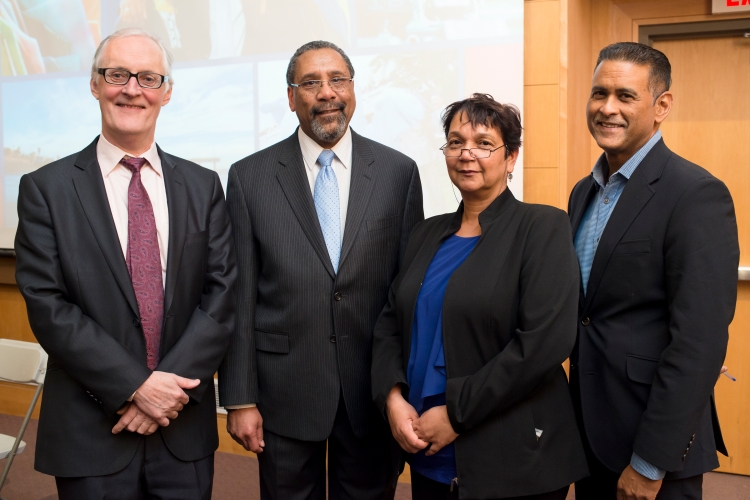
By
Twenty years after the fall of apartheid in South Africa, resolving the devastating disparities that plague the country’s educational system remains a daunting task, two faculty members from the Nelson Mandela Metropolitan University told a Lynch School of Education audience.
Denise M. Zinn, the executive dean of the university’s education faculty, and Allistair Witten, the director of the university’s Centre for the Community School said there are stark differences between schools that “have” and those that “have not” in the areas of facilities, books, teachers and funding.
The legacy of separatism, unstable government funding and the limited resources of families living in poverty have forced communities to undertake education reform efforts with the resources they already possess – however scarce they may be, Zinn said.
The university’s education faculty has established the Manyano Network of Community Schools. Manyano is a word from the indigenous Xhosa people that means “to join in.” The network uses an “asset-based” approach that asks communities what they need, which resources they can provide to meet their needs and how they can partner with other communities and institutions to achieve their goals.
“The model we are pursuing we hope to one day export to other parts of the country, because the need just isn’t in our province – the need is throughout South Africa,” said Zinn, who came to BC with Witten at the invitation of Hon. David S. Nelson Professor of Psychology and Education Anderson Franklin.
Franklin, who asked Zinn and Witten to participate in this year’s Nelson Chair Roundtable for community-based organizations, was a visiting professor last year at the university, based in Port Elizabeth, in Eastern Cape Province.
He said he was impressed by the resiliency of the people he met who maintain hope for the future despite living in extreme poverty. As they work with local communities, his colleagues must carefully navigate both hope and despair.
“There are deplorable conditions which could clearly lead you to despair for the future,” said Franklin. “But as a university, they cannot just see things superficially. What they have tapped into is that resiliency earned by surviving. And that has created a sense of hope and optimism to work for better schools and uplifting the communities in Eastern Cape.”
Lynch School Professor Dennis Shirley followed Witten and Zinn’s presentation with remarks about how researchers and theorists have approached school improvement in countries beset by poverty and governmental neglect.
Witten said that some South African schools rival facilities at America’s elite private academies. But in rural areas and poverty-stricken townships, schools endure despite rusting metal roofs, mud walls, no walls, open pit latrines and a lack of electricity. What the Manyano network guards against is applying off-the-shelf solutions upon these small communities.
Witten said the network taps into the desire in local communities to avoid dependency on state or national funding – since it is delivered so haphazardly from year to year. At the same time, the network pushes for solutions that come from community leaders and parents themselves.
“We have been very deliberate in building a network that is self-directing and self-sufficient,” Witten said. “We did that deliberately because we didn’t want to create a sense of dependency or a sense that we know better because we’re from a university or that we’re going to do everything for them. Communities want to rely on themselves to solve their own problems.”



